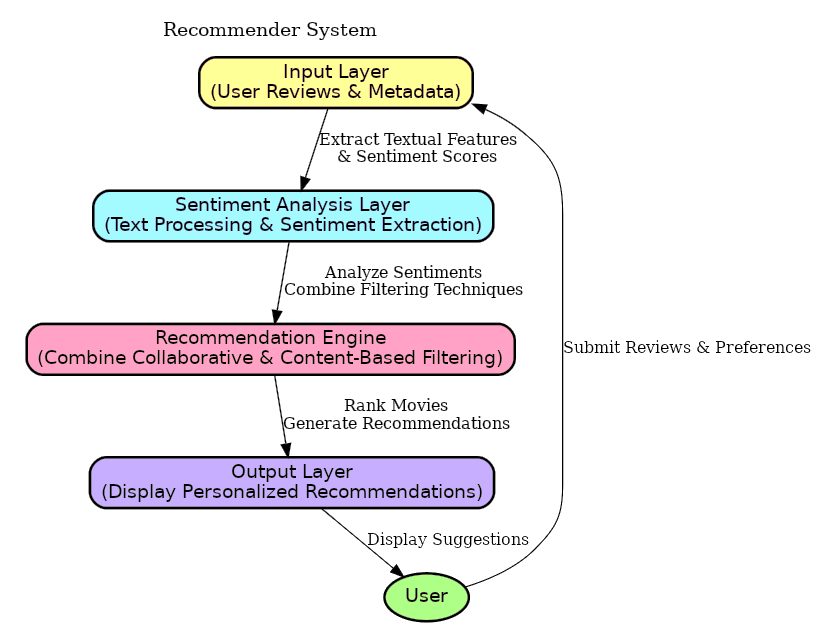Enhancing Movie Recommendations with Aspect-Based Sentiment Analysis and Hybrid Filtering Techniques
DOI:
https://doi.org/10.70162/fcr/2024/v2/i1/v2i1s08Keywords:
Movie Recommender System, Sentiment Analysis, Aspect-Based Sentiment Analysis, Hybrid Filtering, Collaborative Filtering, Content-Based Filtering.Abstract
This paper presents a comprehensive framework to improve movie recommendation accuracy and personalization by integrating sentiment analysis. Traditional recommendation systems, based on collaborative and content-based filtering, often fail to capture the emotional nuances embedded in user-generated reviews. To address this limitation, the proposed system leverages aspect-based sentiment analysis (ABSA) to extract detailed sentiment scores for key movie attributes such as storyline, acting, visuals, and soundtrack. These insights are incorporated into a hybrid recommendation approach that combines collaborative filtering and content-based filtering methods to deliver more contextually relevant recommendations. The sentiment classifier demonstrated a robust performance, achieving an accuracy of 92%, with precision, recall, and F1-scores exceeding 90% for all sentiment classes. Aspect-based sentiment analysis revealed strong user preferences for acting (90% positive sentiments) and storyline (85% positive sentiments), while visuals and soundtrack also received predominantly positive feedback. The hybrid recommender system outperformed standalone techniques, achieving a precision of 91% and reducing the Mean Absolute Error (MAE) to 0.65, thereby ensuring higher recommendation accuracy. Evaluation results underscore the system’s ability to align recommendations with users' emotional and qualitative preferences, significantly enhancing user satisfaction. The findings highlight the potential of integrating sentiment analysis to bridge the gap between user expectations and algorithmic predictions. Future directions include real-time sentiment analysis, multimedia content integration, and advanced deep learning models to further enhance the scalability and applicability of the system in dynamic entertainment ecosystems.

Published
Issue
Section
License

This work is licensed under a Creative Commons Attribution 4.0 International License.
Public Licensing Terms
This work is licensed under a Creative Commons Attribution 4.0 International License (CC BY 4.0).
You are free to:
- Share: Copy and redistribute the material in any medium or format.
- Adapt: Remix, transform, and build upon the material for any purpose, even commercially.
Under the following terms:
- Attribution: You must give appropriate credit, provide a link to the license, and indicate if changes were made. You may do so in any reasonable manner, but not in any way that suggests the licensor endorses you or your use.
To view a copy of this license, visit http://creativecommons.org/licenses/by/4.0/.




